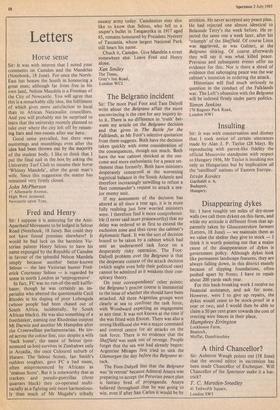The Belgrano incident
Sir: The more Paul Foot and Tam Dalyell write about the Belgrano affair the more unconvincing is the case for any inquiry in- to it. There is no difference in 'truth' bet- ween my article on the Belgrano decision and that given in The Battle for the Falklands, as Mr Foot's selective quotation from them suggests. Both have the decision taken quickly with some consideration of the consequences, though not much. Both have the war cabinet shocked at the out- come and more enthusiastic for a peace set- tlement than formerly. Both have ministers desperately concerned at the worsening logistical balance in the South Atlantic and therefore increasingly unwilling to refuse a fleet commander's request to attack a ma- jor enemy unit.
If my assessment of the decision has altered at all since a year ago, it is in more fully realising just how worried ministers were. I therefore find it more comprehensi- ble (I never said more praiseworthy) that no delay was ordered so as first to extend the exclusion zone and thus cover the cabinet's diplomatic flank. It was the sort of decision bound to be taken by a cabinet which had sent an underarmed task force on a desperately risky operation. The Foot- Dalyell problem over the Belgrano is that the desperate context of the attack decision (which might even help their political case) cannot be admitted as it weakens their con- spiracy theory.
On your correspondents' other points: the Belgrano's precise course is immaterial to the issue of whether she should have been attacked. All three Argentine groups were clearly at sea to confront the task force, with Woodward expecting an engagement at any time. It was not known at the time if she was fitted with Exocet. There was also a strong likelihood she was a major command and control centre for air attacks on the task force. There is no evidence that the Sheffield was sunk out of revenge. People forget that the sea war had already begun: Argentine Mirages first tried to sink the Glamorgan the day before the Belgrano at- tack.
The Foot-Dalyell line that the Belgrano was 'in retreat' because Admiral Anaya was preparing to accept the Peruvian peace plan is fantasy bred of propaganda. Anaya believed throughout that he was going to win, even if after San Carlos it would be by attrition. He never accepted any peace plan. He had rejected one almost identical to Belaunde Terry's the week before. He re- jected the same one a week later, after his 'triumph' of the Sheffield. Of course Lima was aggrieved, as was Galtieri, at the Belgrano sinking. Of course afterwards they will say it was what killed peace. Previous and subsequent events offer no evidence for this. Nor is there a shred of evidence that sabotaging peace was the war cabinet's intention in ordering the attack.
Historians will find much seriously to question in the conduct of the Falklands war. The Left's obsession with, the Belgrano will be indexed firmly under party politics. Simon Jenkins
170 Regents Park Road, London NWI






































 Previous page
Previous page